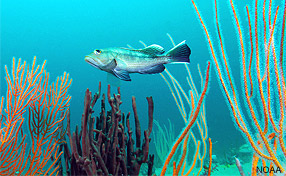Senate Hearing to Focus on Fish in the Southeast
The future of the nation's fishery law is up for debate this week as Congress continues a series of hearings into how well the law has worked and what changes might be needed. What lawmakers decide could have far-ranging effects nationwide. The Nov. 14 hearing, which will be streamed live online from Washington, will focus on fisheries in the Southeast and the U.S. Caribbean.
Lee Crockett, director of the U.S. oceans program for The Pew Charitable Trusts, will be among the witnesses to testify about the Magnuson-Stevens Fishery Conservation and Management Act. The law has resulted in the setting of science-based catch limits on hundreds of species. It also has led to strong measures to rebuild dwindling fish populations.
Leaders from fishery management councils for the Gulf of Mexico, the Caribbean, and the South Atlantic, the regional administrator for the National Oceanic and Atmospheric Administration's Fisheries Service, and several Florida-based fishermen also are expected to testify at the 10:30 a.m. hearing being held by a subcommittee of the U.S. Senate Commerce, Science, and Transportation Committee. Lawmakers are laying the groundwork for the act's reauthorization with a series of hearings in a process that could result in major changes to fishing management nationwide.
“We need to build on the success of the Magnuson-Stevens Act,” said Crockett, who worked to shape the law when it was reauthorized in 2006. “We are ending overfishing and helping depleted species recover, both of which deliver jobs and income to fishermen and their communities. Although some challenges remain, we cannot let shortsighted interests derail this progress and return us to the practices of decades past when poor management allowed chronic overfishing, which led to significant economic hardships in coastal communities.”
 |
The Magnuson-Stevens Act has helped 34 fish stocks recover from severe depletion, including the South Atlantic black sea bass. With the population now more robust, managers in May more than doubled black sea bass fishing quotas from North Carolina to Florida.
Nationwide, half of the rebuilt stocks for which data are available now produce at least 50 percent more revenue than they did when they were at unsustainably low levels. NOAA estimated in 2011 that rebuilding all depleted fish stocks that year would have generated an additional $31 billion in sales impacts, supported an additional 500,000 jobs, and increased the revenue that fishermen receive at the dock by $2.2 billion.
Pew will ask Congress to build upon the law's successes by shifting fishery management toward a system that promotes the health of broader ocean ecosystems rather than addressing one species at a time. Such a system would protect habitat and marine food webs while reducing deaths of fish and other animals that are accidentally taken as bycatch when fishermen target other species. Another key element is conservation of forage fish, the small fish that are a critical food source for other marine life, such as larger fish, whales, and seabirds. Finally, managers must specify how ecosystem-based conservation measures will be incorporated into fishery management plans.
A transition toward ecosystem-based fisheries management comes at a crucial juncture. Wildlife populations and marine ecosystems will need to be more resilient in the face of increasing threats such as global climate change, ocean acidification, invasive species, oil and shipping contaminants, and degraded water quality from pollution sources on land.
The Nov. 14 hearing on fisheries is the second to be held by the committee this year. The first, held in July, addressed issues in New England and the mid-Atlantic regions. More hearings are anticipated in the coming months.
To view the hearing, click here.











